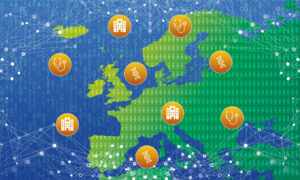
EMBL welcomes Estonia as full member
The Baltic nation of Estonia has become a full member of EMBL, joining the organisation as its 28th member state.

This exciting move follows three years spent as a prospect member, a period which allowed wide-ranging discussions and planning regarding numerous future opportunities between the country and Europe’s life science flagship. Deeper connections were forged during this time, including the signing of a memorandum of understanding between EMBL and the University of Tartu, and several shared workshops exploring possible collaborations in areas including data management and analysis, and the development of joint infrastructures.
Speaking at the end of the formal process of joining, EMBL Director General Edith Heard said, “We are thrilled to welcome Estonia. We look forward to deepening our collaborations with Estonian scientists, with whom there are already many links at EMBL and a strong tradition of excellence. I anticipate a highly productive and mutually beneficial exchange in the years ahead. EMBL is committed to strengthening Europe’s life science community, and to bringing countries together for the benefit of science. By working across borders and enabling researchers from many backgrounds to collaborate together, our work can have a much greater impact.”
New Horizons
During the country’s prospect membership, an Estonian delegation visited EMBL Heidelberg in order to meet with the leaders of different areas of the organisation, and to experience the cutting-edge infrastructure for themselves. The delegation included Renno Veinthal, Deputy Secretary General for Research and Development, Higher Education, and Vocational Education and Training Policy, who gave an insight into why EMBL membership will be such a valuable asset for his country.
“Historically the life sciences in Estonia have been in a very favourable position. In addition, we have a very well-developed start-up community, and we are well-known for our entrepreneurial attitude. I hope that, in the future, we can diversify our start-up sector and the place of life sciences within it.
The Deputy Secretary General also expressed how positive this move to full membership would be. “This is a truly impressive organisation. Access to this kind of infrastructure will mean a lot for the Estonian research community, and provide a great platform for career development under the best possible supervision. This partnership will also help us to build up our own system in Estonia, to welcome those researchers back at some point in the future.”
Closely aligned aims
Estonian accession to full EMBL membership comes at an exciting time, given the ‘Molecules to Ecosystems’ programme and the work of the Transversal Themes. There are a large number of very closely aligned research goals and shared ambitions. “We have a very long coastline,” Veinthal explained, “and we see high levels of pollution along the Baltic Sea. The human impact on this stretch of coastline is enormous, and there is a growing understanding that we must do more to improve it.” Such concerns are closely tied to the fundamental research that underpins the work of EMBL-coordinated projects such as the BIOcean5D collaboration and the TREC marine expedition. In summer 2023, the TREC project will visit the Estonian capital Tallinn, conducting sampling experiments and holding a number of public engagement events, as part of its year-long expedition tracing the European coastline.
Expanding on how Estonia sees its priorities in relation to joining EMBL, Veinthal also spoke about the attraction of being part of an international organisation which places research excellence at the core of its operations. “We want to build on this excellence, and bridge gaps to ensure that career paths are there to allow young researchers students to benefit from those conducting top research. Another priority is to make knowledge transfer much more efficient, and part of that is to ensure that researchers can move easily from academia to industry, and vice-versa. The best way to get ideas and technology moving is to allow people to move and spread those ideas through interactions, and this kind of partnership is vital for that,” he added.
Following the accession, EMBL Head of International Relations Plamena Markova said. “We are delighted to welcome Estonia as EMBL’s 28th member state. With its vibrant research ecosystem, Estonia has much to offer to the European life science community, and EMBL membership will amplify this. We share the ambition to deliver ground-breaking science in a collaborative way and with relevance to society. Estonia’s membership will help us realise this ambition in a synergistic way, capitalising on our respective strengths but also by creating new opportunities to deliver innovative research.”


